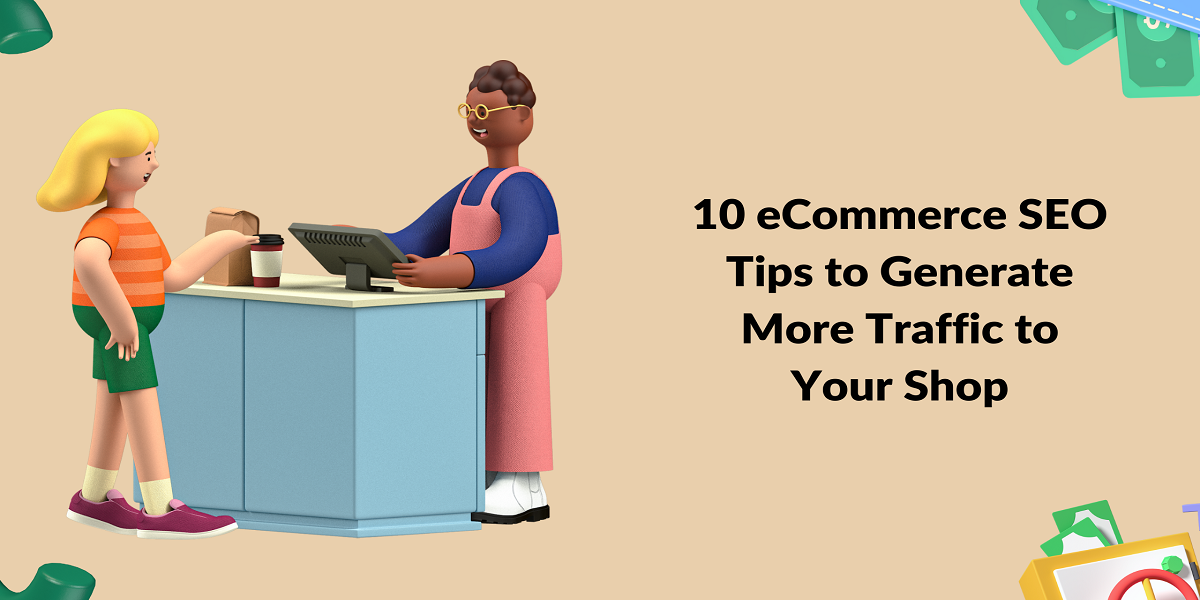
eCommerce SEO increases the visibility of your online store in search engine results pages (SERPs). You want to show up as high in search results as possible to attract as many visitors as you can for the goods you sell.
Optimizing your headlines, product descriptions, metadata, internal link structure, and navigational structure for search and user experience is typically part of eCommerce SEO. You should have a page specifically created to attract visitors from search engines for each product you sell. You may also hire an eCommerce SEO company in India to work extensively on your shop's successful SEO tactics.
The following blog discusses the 10 eCommerce SEO tips to generate more traffic to your shop.
Understanding eCommerce SEO
Ecommerce SEO is a collection of optimization methods that help your website rank higher in search results. With the help of SEO for eCommerce, you can show up in more pertinent search results, which will help you increase the traffic, leads, and sales to your online business. You miss out on critical access to qualified and interested eCommerce customers if your website doesn't appear in the SERPs. Although your products may be listed online, can people locate them?
Ecommerce SEO comes into play here. It allows you to contact your target audience without spending money on advertisements. Once you've drawn visitors to your website, you may enchant them with your top-notch goods, captivating text, and compelling calls to action.
Ecommerce SEO Tips to Follow
The eCommerce market is cutthroat. The competition occasionally becomes brutal. You must learn some helpful eCommerce SEO tips and tactics to remain in a world where only the prepared survive.
Here are 10 of them that you ought to start doing right away
1. Conduct Keyword Research to Identify the Best Keywords
Finding pertinent keywords and including them on your e-commerce site is the first step in any e-commerce SEO plan. The battle for keywords among e-commerce websites will be fierce.
Using SEO tools like Google Keyword Planner, you may determine how competitive your target keywords are. Since fewer individuals are searching for these, the competition is lesser because they are more specific. For this reason, you must do more research to locate long-tail keywords.
2. Utilize Structured Data for Your Online Store
A helpful feature on your e-commerce website is structured data markup, which enables search engines to give more details about the goods you sell. To improve CTR and your consumers' user experience, display your star rating, number of reviews, price, and availability. This will increase your desire to click! You can add structured data on your own if you've built your e-commerce website.
3. Make Your Product Images Customer and Search Engine Friendly
Make sure to optimize your product photos before submitting them. This entails completing the ALT tag section. Your specific keywords should be inserted here. Remember that posting eye-catching product photos is insufficient.
4. Boost the Speed of Your Website
Improve your site's loading speed to improve its search rank and get more organic eCommerce website traffic.
5. Make Your Website Mobile-Friendly
Your website must be mobile-friendly and have functional strategies like integrating your online store. More than half make purchases on their phones.
Search engines favor optimized content for mobile devices. Make sure your website's pages can't be resized. Streamline your material to make it easier to navigate your website.
6. Improve the URLs you Use
The user experience is greatly influenced by URLs, which might help your e-commerce SEO efforts. They not only inform site users of what to anticipate from a link, but they also communicate the page's topic to search engines.
Stay away from overly long URLs that are filled with numbers but lack valuable keywords.
7. Skip Any Broken Links
Broken links are inconvenient for customers and search engines, just as optimized URLs benefit both. Establish a 301 redirect whenever you alter a URL to ensure that users and search engines are sent to the correct page.
8. Create Appropriate Internal Links
Internal links to your product and category pages indicate to the search engine that these sites are essential. The transfer of authority from one page to another is referred to as "link equity" or "link juice" in this context.
Linking to your content aids eCommerce SEO, while external backlinks from highly authoritative websites have a considerably more significant influence.
9. Prioritize Link Building
You can establish the architecture of your site using internal links. Internal links must also be created, but not only internal links. You want to think of ones that are SEO-friendly.
They also aid in distributing link equity among your various web pages. The inclusion of internal links will let search engine crawlers know that the pages you linked do have a connection.
10. Avoid Duplicate Content
Duplicating your content is one of the greatest eCommerce SEO mistakes. Product descriptions make up a large portion of this identical content.
You will receive merchandise from a business that collaborates with your online store. The descriptions of their products are also available. The issue, though, is that they provide the same descriptions to other websites they collaborate with.
At the End
We genuinely hope that our eCommerce SEO tips will assist you in developing a successful search engine optimization plan for your online store and generate more traffic to your shop leading to significant profits.
